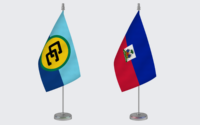Border Controversy: Russia supports international law
December 9, 2023

“We consider it a priority to reduce tension and build confidence in relations between Venezuela and Guyana,” Russian foreign ministry spokeswoman Maria Zakharova said in a statement.
“We call on the parties to refrain from any actions that could unbalance the situation and cause mutual harm,” she said.
The disputed region, named after the adjoining Essequibo river, has been part of Guyana for over a century and is home to some 125,000 of the country’s 800,000 citizens.
Venezuela, an oil-rich nation led by longtime President Nicolas Maduro, maintains close ties with Russia and has criticised the West for sanctioning Moscow over its Ukraine offensive.
See below the full text of Zakharova’s comment on the issue:
“We are closely following the developments around Essequibo, considering the results of the December 3 consultative referendum in Venezuela on the status of this area and legal steps following this event.
In our view, this is a matter of Venezuela-Guyana relations and should be settled in a neighbourly way by finding peaceful mutually acceptable solutions in accordance with international law, bilateral agreements and national legislation.
We believe that the priority in the current situation is to reduce tensions and strengthen trust between Venezuela and Guyana. We urge them to refrain from any actions that may unbalance the situation and harm both sides.
We welcome the December 6 telephone conversation between Foreign Minister of Venezuela Yvan Gil and his Guyanese counterpart Hugh Todd. We hope they will continue such contacts.
We oppose foreign pressure and interference in the affairs of sovereign states, especially when it comes to delicate issues requiring caution from third countries at both public and private level.
We reaffirm our position of principle that Latin America should remain a zone of peace, as the CELAC countries announced at the Havana summit in 2014. We support the efforts to enhance regional unity and welcome Latin American and Caribbean countries consolidating their position as an influential centre of the emerging multipolar world”



